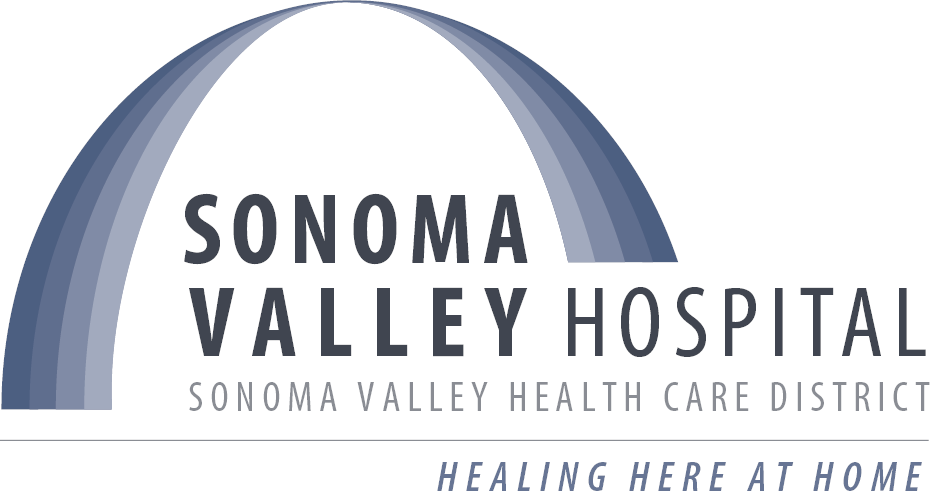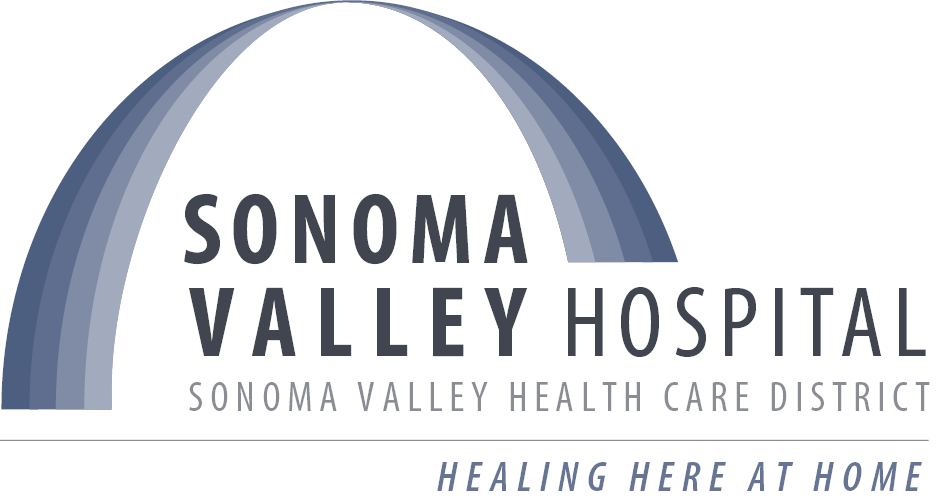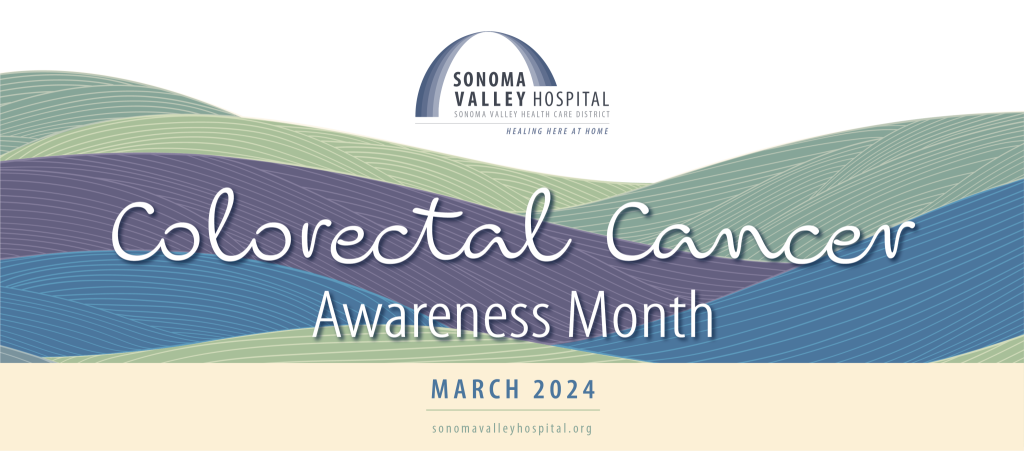
Stepping into National Cancer Awareness Month
Dear Sonoma Valley Community,
As we step into National Colorectal Cancer (CRC) Awareness Month, this month’s newsletter aims to shed light on the critical aspects of CRC, from early detection and prevention to advanced treatment options available right here in our community.
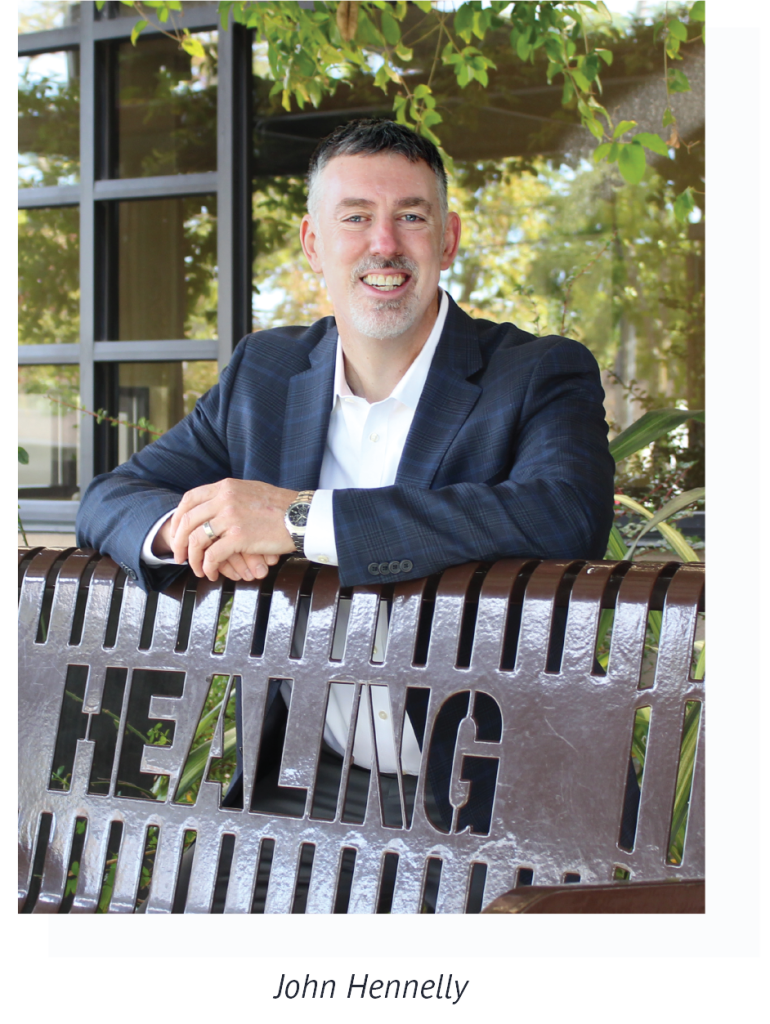
One of the highlights of this month’s newsletter is an exclusive “Ask the Expert” segment featuring Dr. Sabrina Kidd, our esteemed colorectal surgery specialist. Dr. Kidd brings a wealth of experience and a deep passion for her work in colorectal cancer prevention and treatment. Her insights offer a profound look into the advancements in CRC care, emphasizing the power of early detection and the importance of making informed lifestyle choices. Dr. Kidd’s journey from general surgery to specializing in colorectal surgery underscores her commitment to combating this disease and her dedication to our community’s health and well-being.
Moreover, we understand the importance of having access to high-quality healthcare resources close to home. Our range of screening and diagnostic services, including the addition of our new 3T MRI, represents our commitment to offering advanced care right here in our community. This state-of-the-art technology not only aids in the early detection of CRC but also minimizes the need for our patients to travel far for exceptional care.
We encourage you to read through this month’s newsletter, learn from Dr. Kidd’s expertise, and explore the resources Sonoma Valley Hospital offers.
Warm regards,

John Hennelly
CEO, Sonoma Valley Hospital
Ask Our Expert: Dr. Sabrina Kidd on Colorectal Cancer Awareness and Prevention
In recognition of National Colorectal Cancer Awareness Month, the Sonoma Valley Hospital is honored to feature our expert Dr. Sabrina Kidd, a distinguished colorectal surgery specialist. Dr. Kidd shares her insights on colorectal cancer (CRC), emphasizing the importance of awareness, prevention, and the latest advancements in treatment.
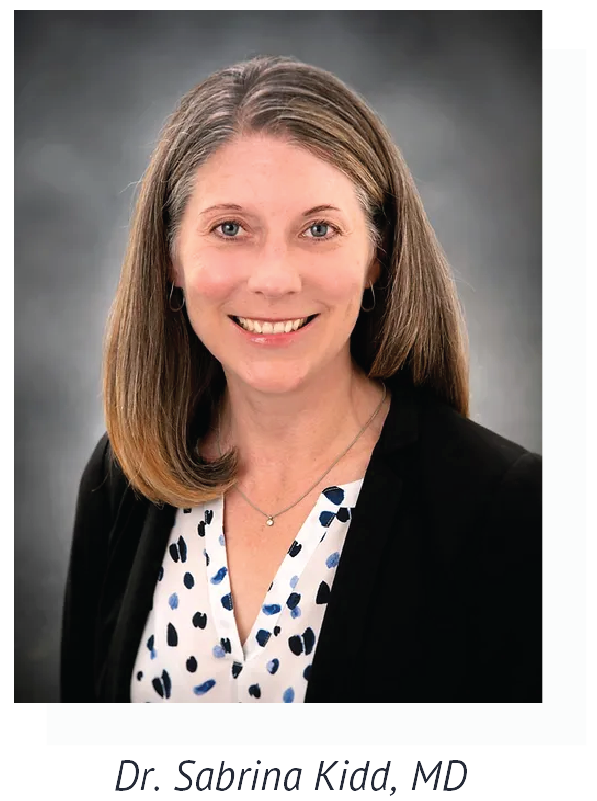
Q: Could you share a bit about your background and what drew you to specialize in colorectal cancer treatment?
A: I began my medical career as a general surgeon, and over time, I became particularly interested in the technical aspects and the preventative potential of colorectal surgery. The fact that CRC is largely preventable and treatable made me want to specialize in this field. After five years in general surgery and a year in colorectal surgery, I knew this was my calling.
Q: What brought you to practice at Sonoma Valley Hospital?
A: I started in Marin in 2011 and moved to Sonoma in 2015. The small-town feel and the community here drew me in. It allowed me to step away from trauma surgery and focus more on colorectal surgery (CRS), adopting a more holistic approach to patient care and really getting to know my patients.
Q: Can you explain what colorectal cancer is and why awareness about it is so important?
A: Colorectal cancer is the second leading cause of cancer death in the US, affecting both men and women, with a slightly higher mortality rate in women. It’s crucial to promote awareness because CRC is preventable through screenings and lifestyle changes. It typically starts from polyps which means early detection and removal can prevent cancer from developing.
Q: Who is most at risk for colorectal cancer, and what are the latest statistics?
A: The vast majority of CRC cases are sporadic, with no known genetic or family history. However, we’re seeing an increase in cases among people with inflammatory bowel conditions and those with poor lifestyle habits, such as high sugar diets and smoking. Despite the known risks, many resist changing their lifestyles.
Q: What are the main risk factors for developing colorectal cancer?
A: More than 90% of cases have no known genetic link, making lifestyle factors, like diet and smoking, significant risk factors. Inflammatory conditions in the bowels also increase the risk.
Q: How significant is the role of genetics in colorectal cancer?
A: While most CRC cases are sporadic and not genetically linked, it’s essential to understand your family history as it might influence screening recommendations.
Q: What lifestyle changes can people make to reduce their risk of colorectal cancer?
A: Shifting towards a diet low in processed foods, sugars, and high in plant-based foods can significantly reduce CRC risk. It’s about choosing whole foods over highly processed ones.
Q: At what age should individuals start getting screened for colorectal cancer, and how often?
A: Screening should start at age 45 or earlier if there’s a family history or other risk factors. The frequency depends on the initial screening results and personal risk factors.
Q: How has the approach to colorectal cancer screening changed in recent years?
A: The screening age was lowered from 50 to 45 around 2018 due to an increase in advanced polyps found in younger patients. This change aims to catch potential issues at an earlier, more treatable stage.
Q: What are the most promising research developments in the fight against colorectal cancer?
A: Immunotherapies show a lot of promise, offering more effective treatments with fewer side effects. The future also looks bright for advancements in screening and understanding the role of inflammation in CRC.
Q: Can you talk about the resources and support Sonoma Valley Hospital offers to patients diagnosed with colorectal cancer?
A: We offer a full range of screening and diagnostic services, including CTs, lab work, and colectomies. While we don’t have an oncologist in Sonoma, we ensure our patients are connected to UCSF for any specialized care they might need.
Q: How will the addition of the new 3Tesla MRI impact care and treatment plans for your patients at Sonoma Valley Hospital?
A: The new 3T MRI, especially with the rectal coil, will enhance our ability to diagnose and treat not only CRC but also other conditions. It allows for more detailed imaging right here in Sonoma, reducing the need for patients to travel for care.
Q: Is there anything else you’d like to share with our readers about colorectal cancer awareness or nutrition?
A: It’s essential to take care of yourself, get your screenings, and communicate openly with your healthcare provider about any concerns. Awareness and proactive health management can make a significant difference in preventing colorectal cancer.
Sonoma Valley Hospital Resources
At Sonoma Valley Hospital, we are committed to providing comprehensive and advanced care for our community. Our range of screening and diagnostic services includes CT scans, lab work, and surgical options such as colectomies, tailored to meet the needs of our patients facing colorectal cancer and other conditions. While Sonoma Valley does not have an oncologist on-site, we ensure a seamless connection to UCSF for specialized oncological care, guaranteeing our patients access to the best possible treatment options. Furthermore, the addition of our new 3T MRI machine, equipped with a rectal coil, marks a significant advancement in our diagnostic capabilities. This state-of-the- art technology allows for more detailed imaging, enhancing our ability to accurately diagnose and treat colorectal cancer and other medical conditions right here in Sonoma, minimizing the need for our patients to travel for high-quality care.
Understanding Colorectal Cancer Screening Guidelines – Key Points
What is Colorectal Cancer?
Colorectal cancer (CRC) encompasses both colon and rectal cancers, distinguishing itself as a particularly preventable and treatable form of cancer, especially when detected in its early stages. Despite this, it remains a significant health concern in the United States, with over 150,000 individuals diagnosed and more than 50,000 deaths annually. This type of cancer begins as a polyp, an abnormal growth of tissue within the colon or rectum. Through screening tests, these polyps can be identified and removed before they have the chance to develop into cancer, offering a powerful means of prevention.
Prioritizing Colon Health
Ensuring the health of your colon is as vital as caring for any other body part. Embracing healthy eating habits, engaging in regular physical activity, following recommended screening guidelines, and leading a generally healthy lifestyle are key elements in maintaining your colon’s well-being. Transitioning to a diet that minimizes processed foods and added sugars while maximizing plant-based foods can notably decrease your risk of colorectal cancer (CRC). Opt for whole, anti-inflammatory foods to make choices that support your colon health.
